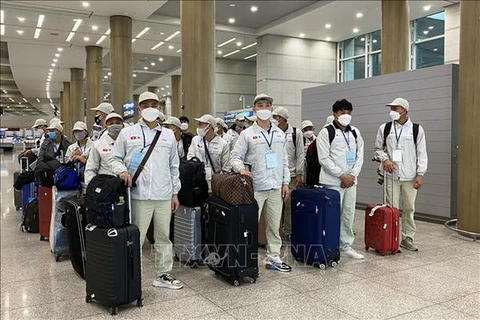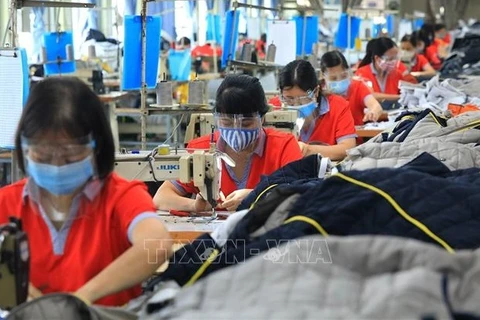Hanoi (VNA) – Deputy Prime Minister Vu Duc Dam on April 20 chaired a meeting to discuss the employment situation and measures to deal with the labour shortage.
According to a report by the Ministry of Labour, Invalids and Social Affairs (MoLISA), the economic recovery and development policies by the National Assembly and the Government have created the impetus for the restoration and development of production and business in the first quarter of 2022, thus positively affecting labour, employment, and labour recruitment demand in enterprises.
In Q1, the COVID-19 pandemic still had a negative impact on more than 16.9 million people aged 15 and over, but this marks 7.8 million less than the figure in the fourth quarter of 2021. The number of workers losing their jobs is 900,000, accounting for 1.2 percent of the total number of the employees.
According to localities’ initial reports, enterprises' recruitment demand in 2022 is nearly 1.3 million employees, up 18 percent compared to that in 2021, but this is still lower than those in 2019 and 2020. Firms mainly need unskilled workers, accounting for 75 percent.
Notably, in the first three months of this year, there was a labour shortage in some areas and regions, with about 120,000 workers, nearly 10 percent compared to the recruitment demand, 2-3 percent higher than in previous years, mainly in the fields of garment and textiles, electronics assembly, wood processing, tourism and education.
This year, the pandemic is forecast to negatively impact over 5 million labourers and there maintains a labour supply-demand imbalance in several regions.
At the meeting, a leader of the MoLISA proposed a number of solutions to directly support workers as well as employers in attracting and recruiting labourers, step up training to improve the quality of the employees, and enhance the connectivity between labour supply and demand.
Participants stressed the need to maintain the effective implementation of resolutions, decrees and decisions of the Government and the Prime Minister to assist employees affected by the pandemic.
MoLISA was urged to carry out the vocational education development strategy for the 2021-2030 period./.
According to a report by the Ministry of Labour, Invalids and Social Affairs (MoLISA), the economic recovery and development policies by the National Assembly and the Government have created the impetus for the restoration and development of production and business in the first quarter of 2022, thus positively affecting labour, employment, and labour recruitment demand in enterprises.
In Q1, the COVID-19 pandemic still had a negative impact on more than 16.9 million people aged 15 and over, but this marks 7.8 million less than the figure in the fourth quarter of 2021. The number of workers losing their jobs is 900,000, accounting for 1.2 percent of the total number of the employees.
According to localities’ initial reports, enterprises' recruitment demand in 2022 is nearly 1.3 million employees, up 18 percent compared to that in 2021, but this is still lower than those in 2019 and 2020. Firms mainly need unskilled workers, accounting for 75 percent.
Notably, in the first three months of this year, there was a labour shortage in some areas and regions, with about 120,000 workers, nearly 10 percent compared to the recruitment demand, 2-3 percent higher than in previous years, mainly in the fields of garment and textiles, electronics assembly, wood processing, tourism and education.
This year, the pandemic is forecast to negatively impact over 5 million labourers and there maintains a labour supply-demand imbalance in several regions.
At the meeting, a leader of the MoLISA proposed a number of solutions to directly support workers as well as employers in attracting and recruiting labourers, step up training to improve the quality of the employees, and enhance the connectivity between labour supply and demand.
Participants stressed the need to maintain the effective implementation of resolutions, decrees and decisions of the Government and the Prime Minister to assist employees affected by the pandemic.
MoLISA was urged to carry out the vocational education development strategy for the 2021-2030 period./.
VNA
























